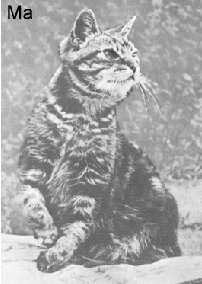The oldest cats

How old can a cat get? Will that cute kitten you get for your five year old daughter still be around when she goes off to college? You love your cat - how many years will she provide you with affection and companionship? You hate the neighbour's cat - for how many years will it continue to serenade you with its nightly yowling? The answer is that the life of an average cat is just under 18 months - but cats, remember, have nine lives!
It is hard to tell the age of a cat. Perhaps one reason why they always look so superior is that cats do not get wrinkled or go grey in the way that humans do, and even older cats tend to keep their teeth. A slower, sleepy cat might be elderly, or just lazy. Many cats are active right through their lives. An English tabby cat is on record as having killed a stoat (a vicious weasel like-carnivore) at the age of 19, while an American cat was still producing kittens at the age of 30.
Reports of cats reaching record ages crop up regularly. Many of these cannot be proven, since they rely on anecdotal evidence. Because some owners tend to go for a certain type of cat, sometimes the combined lifetimes of several of cats are put forward under one name. Therefore there are several contenders for the title of oldest cat, and who you believe depends on the level of proof you are prepared to accept. most certifying organizations ask for either a birth certificate or a report from a vet who has known the cat all its life or (preferably) both.
Given these standards, it is probable that the oldest cat ever was a Texas cat called Creme Puff - the official holder of the title in the Guinness book of Records. Creme Puff was born in early August of 1967 - while Bonanza was a hit show on television, the Vietnam war was raging, and the first heart transplants were being performed. Creme Puff made it through to the new Millenium, and died in 2004 at the age of 37.
There are numberous reports of cats which have lived into their thirties. A well documented case is that of Ma who lived for most of the first half of the 20th century. Ma got her paw caught in a trap whilst still a kitten. The injury meant that Ma needed special attention all her life, so her medical records stretched across 34 years from 1923 to 1957. Bobby, an Irish cat died at the age of 32 in 1973. Not unexpectedly, given the hazards that go with the job, the title of the oldest living cat changes holders very often, but there are currently a crop of contenders reaching their thirties who will hopefully continue to slug it out for a few years yet.
On average, it is probable that indoor cats live longer than outdoor cats, though the stress of indoor living, and the dangers of obesity (a leading cause of diabetes and heart disease) and lack of exercise mean that the difference is not as great as many suppose. And the very oldest cats tend of be outdoor cats since they are familiar with the hazards of an outdoor living and have the benefit of a lifetime of fresh air and exercise.
A good diet is very important in extending a cat's lifespan, but the main factors seem to be genetic. Littermates seem to enjoy approximatly the same lifespans, and on the whole the cross-breed vigour of domestic moggies gives them a longer life than highly bred aristocats. (Though a Burmese called Kataleena Lady was still living in Australia in 2004, and a Sphynx, appropriately called grandpa, reached 34).
A lifespan of between ten and 25 years seems to be the average for Felidae of all types. Lions in the wild seldom live more than 16 years, but in zoos they seem able to add another ten years to that. The same is true of tigers. By way of comparision, a feral cat of 19 years of age has been reliably reported.
Few of the millions of cats alive today will make it to their thirtieth birthday. However, the lifetime of the average cat is increasing rapidly as ever more cats come to enjoy the benefits of good diet and vetinary care. Barring disease or accident, there is no reason why a cat should not live well into its teens, and the number of cats celebrating their twenty first birthday increases every year.

